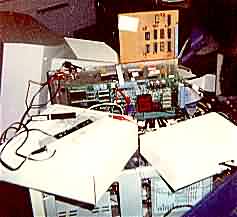 The
Programmers’ Retirement
The
Programmers’ Retirement The
Programmers’ Retirement
The
Programmers’ RetirementWednesday, February 11, 2009 3:20 pm. The admirable Visual Studio
magazine
presented Daniel Appleman on page 40 of the 2/09 issue asking
the ever-popular question “Where did all the developers go?”
...  But I was
first! — Where
Have All the Programmers Gone? (aka “Whither programming?
8/21/07”
in my beautiful blog contents
there). ... We
both used the same google trends source! — so we both stold from
the best! ... In
“Whither” I suggested they all went to India; Appleman is more
catholic
in his selection from the basically-frightening google region ranking
mechanism (they know where you are — and they
don’t care!)....
But I was
first! — Where
Have All the Programmers Gone? (aka “Whither programming?
8/21/07”
in my beautiful blog contents
there). ... We
both used the same google trends source! — so we both stold from
the best! ... In
“Whither” I suggested they all went to India; Appleman is more
catholic
in his selection from the basically-frightening google region ranking
mechanism (they know where you are — and they
don’t care!)....
But me and my brain trust here, the LOL, realized the obvious truth....
I.e., like when printing was invented, the people employed in the extremely high-tech manuscript copying racket wound-up on the ol’ ash-heap of history there. ... The comparison is pretty good: pretty-much the same thing happened:
1440: Guttenberg invents printing press. Soon skilled literary/written-material technicians start losing work, often to crude barely-literate workmen types.
1991: Berners-Lee invents the world wide web. Soon skilled software technicians start losing work to people who just find programs on the web — often crude non-technical types.
I mean, I’m sorry, but that is precisely what happened. ... How do I know? I was there. ... I remember (cough cough; elderly creaking). ... When you wanted a program at your little company, you found yourself a programmer, no matter how annoying they were — or you found the reason why! ... Yessirree, things were great then! ... None of this stinky internet, where all the obvious programs are usually available for free, or for some reasonable (!!!) price! ... How can we make a living, with such unfair competition!?!?
 The Microcomputers
The MicrocomputersIn their turn, the microprocessors made the programmer boom; because, obviously, without them you only needed a few (ten; twenty; a thousand?) programmers for each mainframe, and there were only so many mainframes. ... But every stupid little company had to have one or more microcomputers, to compete with the others. ... And they were useless without software — and the only place to get software was from confiscatory scam artist stores at the mall for goodness sake, or by hiring programmers — often with similar defects, but at least you could fire them....
... I remember when I first encountered WordStar around 1983 (tinkle tinkle flashback music); it was almost as beautiful as leaving high school! ... A text editor with help; you didn’t have to remember 5,000 cryptic modal letter commands, about 99% of which would erase everything on whatever pitiful storage mechanism you were using. ... WordStar was supposedly a word processor — and of course it was: if it didn’t make-up the category, it certainly defined it. ... You could see where the line-endings would wind-up when your document was printed! Right there on your pitiful 25-line 80-character CRT screen! ... In those distant days I got a programming job where every machine was equipped with WordStar, which we used in the non-document mode. ... And it was good. ... And it almost certainly didn’t cost that much, because the management probably stold it! ... I mean, they may have bought a single diskette and then made numerous copies, which practically everybody thought was perfectly normal; or they may have used one of those dangerous BBSs. ... But the cheap/free software genie was aching to be free of the bottle, and it was only a matter of time before the web showed-up. ... A good long time, all things considered, and we had a lot of fun in those tumultuous years (ruminative chuckling). ... I remember an earnest very handsome young man there, trying to explain to a secretary — at length ... it seemed to go on for hours — how the incredibly terse and ridiculous CP/M “PIP” command worked....
 e
ran out of work. ... I used to
claim I wouldn’t
be affected, because I programmed hardware devices, not like those
déclassé
IT kind-of guys, and
that’s absolutely
true! ... And I would never
lie.
... But sadly most of the gadgets went to the east some time ago; some
are still doubtlessly programmed in the US —
the sacred Iphone I would hope — but I assume the rest are wandering
about in
the wide world, the embedded programming jobs following them....
e
ran out of work. ... I used to
claim I wouldn’t
be affected, because I programmed hardware devices, not like those
déclassé
IT kind-of guys, and
that’s absolutely
true! ... And I would never
lie.
... But sadly most of the gadgets went to the east some time ago; some
are still doubtlessly programmed in the US —
the sacred Iphone I would hope — but I assume the rest are wandering
about in
the wide world, the embedded programming jobs following them....
... It wasn’t like all the copier-monks had to go back to treating lepers; literary, even “typesetting” skills were needed in the new era, and I don’t doubt a few prospered. ... And people still program, even today! But given the increasingly frictionless nature of commerce on the web, particularly for a product that gains absolutely nothing from being delivered in a solid form — probably loses — the programmers will inevitably program less, for every passing year (welling-up sentimental “resolution” music)....
  
|